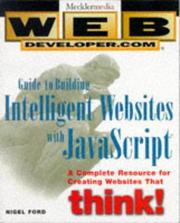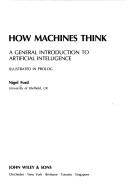| Listing 1 - 6 of 6 |
Sort by
|
Book
ISBN: 9780857023643 9780857023650 Year: 2012 Publisher: Los Angeles, Calif. Sage
Abstract | Keywords | Export | Availability | Bookmark
 Loading...
Loading...Choose an application
- Reference Manager
- EndNote
- RefWorks (Direct export to RefWorks)
Multi
ISBN: 9781856048507 1856048500 9781783301843 1783301848 Year: 2015 Publisher: London Facet
Abstract | Keywords | Export | Availability | Bookmark
 Loading...
Loading...Choose an application
- Reference Manager
- EndNote
- RefWorks (Direct export to RefWorks)
This landmark textbook is an essential primer for students and practitioners interested in information seeking, needs and behaviour, user studies and information literacy. Introduction to Information Behaviour uses a combination of theory and practical context to map out what information behaviour is and what we currently know about it, before addressing how it can be better understood in the future. Nigel Ford argues that new understandings of information behaviour research may help maximise the quality and effectiveness of the way information is presented, sought, discovered, evaluated and used.
Information retrieval --- Information behavior. --- Information literacy. --- Comportement dans la recherche de l'information --- Culture de l'information --- Information behavior --- Information literacy --- E-books --- Literacy, Information --- Information science --- Information-seeking behavior --- Human behavior --- Information Seeking Behavior --- Information Storage and Retrieval --- Information Literacy --- Internet --- utilization --- Internet - utilization

ISBN: 0471242748 Year: 1998 Publisher: New York Chichester Toronto John Wiley
Abstract | Keywords | Export | Availability | Bookmark
 Loading...
Loading...Choose an application
- Reference Manager
- EndNote
- RefWorks (Direct export to RefWorks)
JavaScript (Computer program language) --- JavaScript (Langue de programmation) --- JavaScript (Programmeertaal) --- website --- javascript --- internet --- Web sites --- Design --- JavaScript(Computer program language) --- Authorship --- Web site development --- Microformats --- Domain-specific programming languages --- Object-oriented programming languages --- Scripting languages (Computer science)

ISBN: 0471911399 Year: 1987 Publisher: Chichester : John Wiley & sons,
Abstract | Keywords | Export | Availability | Bookmark
 Loading...
Loading...Choose an application
- Reference Manager
- EndNote
- RefWorks (Direct export to RefWorks)
Artificial intelligence. --- Machine learning. --- language classifications: applicative languages; data-flow languages; design languages; extensible languages; macro and assembly languages; nonprocedural languages; specialized application and very high-level languages (Programminglanguages) --- Artificial intelligence (AI) in general; cognitive simulation; philosophical foundations --- 681.3*I20 Artificial intelligence (AI) in general; cognitive simulation; philosophical foundations --- 681.3*D32 language classifications: applicative languages; data-flow languages; design languages; extensible languages; macro and assembly languages; nonprocedural languages; specialized application and very high-level languages (Programminglanguages) --- Artificial intelligence --- Machine learning --- 681.3*D32 --- 681.3*I20 --- AI (Artificial intelligence) --- Artificial thinking --- Electronic brains --- Intellectronics --- Intelligence, Artificial --- Intelligent machines --- Machine intelligence --- Thinking, Artificial --- Bionics --- Cognitive science --- Digital computer simulation --- Electronic data processing --- Logic machines --- Machine theory --- Self-organizing systems --- Simulation methods --- Fifth generation computers --- Neural computers --- Learning, Machine --- Intelligence artificielle --- Apprentissage automatique
Book
ISBN: 0853659095 Year: 1991 Publisher: London Library Association Publishing
Abstract | Keywords | Export | Availability | Bookmark
 Loading...
Loading...Choose an application
- Reference Manager
- EndNote
- RefWorks (Direct export to RefWorks)
AI(Artificial intelligence) --- Artificial intelligence --- Artificial thinking --- Artificiële intelligentie --- Cerveaux électroniques --- Electronic brains --- Expert systems (Computer science) --- Expertsystemen (Informatica) --- Intellectronics --- Intelligence [Artificial ] --- Intelligence artificielle --- Intelligent machines --- Kunstmatige intelligentie --- Machine intelligence --- Machines intelligentes --- Pensée artificielle --- Systèmes experts (Informatique) --- Thinking [Artificial ] --- Applications and expert systems (Artificial intelligence). Cartography. Games. Industrial automation. Law. Medicine and science. Natural language interfaces. Office automation--See also {681.3*H4}; {681.3*J} --- 681.3*I21 Applications and expert systems (Artificial intelligence). Cartography. Games. Industrial automation. Law. Medicine and science. Natural language interfaces. Office automation--See also {681.3*H4}; {681.3*J} --- 025:681.3 --- 681.3*I21 --- AI (Artificial intelligence) --- Intelligence, Artificial --- Thinking, Artificial --- Bionics --- Cognitive science --- Digital computer simulation --- Electronic data processing --- Logic machines --- Machine theory --- Self-organizing systems --- Simulation methods --- Fifth generation computers --- Neural computers --- Knowledge-based systems (Computer science) --- Systems, Expert (Computer science) --- Computer systems --- Soft computing --- 025:681.3 Bibliotheekautomatisering --- Bibliotheekautomatisering --- Artificial intelligence. Robotics. Simulation. Graphics --- Library automation --- Artificial intelligence.
Book
ISBN: 9781446287927 Year: 2012 Publisher: Los Angeles, [Calif.] ; London : SAGE,
Abstract | Keywords | Export | Availability | Bookmark
 Loading...
Loading...Choose an application
- Reference Manager
- EndNote
- RefWorks (Direct export to RefWorks)
In recent years, the internet has provided students and researchers with fantastic opportunities and a distinct set of challenges. Nigel Ford shows how these opportunities and challenges impact on student research projects and explains the skills needed to navigate the web and use it effectively.
| Listing 1 - 6 of 6 |
Sort by
|

 Search
Search Feedback
Feedback About UniCat
About UniCat  Help
Help News
News